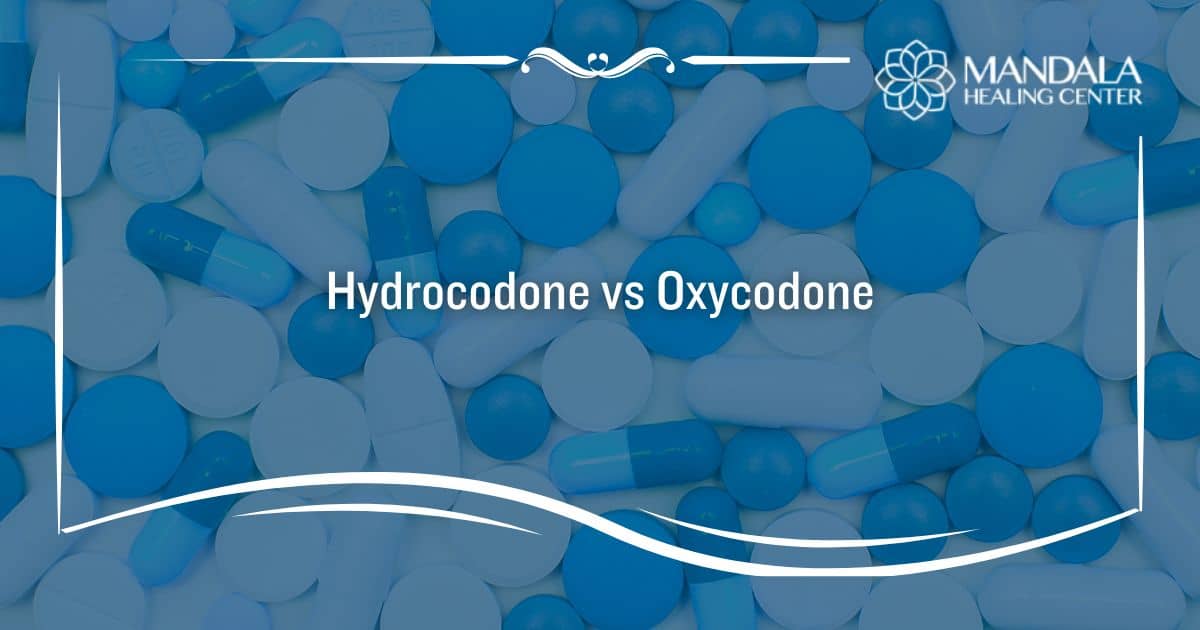Opioids are a class of prescription medications used to treat pain. Some of the substances that belong to this class of drugs include hydrocodone, morphine, codeine, fentanyl, and oxycodone. Opioids slow down the central nervous system in your brain and attach to opioid receptors to limit the symptoms of pain.
Because of the way that opioids interact with your central nervous system, they can cause you to feel high. This is why opioids are often abused and can cause you to develop an addiction. In fact, addiction to opioids is so common that it has become an epidemic in the United States.
According to the National Institute of Drug Abuse, opioid overdose death rates rose from 68,630 in 2020 to 80,411 in 2021.[1]
Two of the most commonly prescribed opioids are hydrocodone and oxycodone. While these substances have many similarities, such as their potential for addiction, there are also some differences to be aware of.
The Similarities Between Hydrocodone and Oxycodone
Hydrocodone and oxycodone are both semi-synthetic opioids that are used to treat moderate to severe pain. Both have medicinal uses but are extremely habit-forming when they are abused, which is why they are considered Schedule II controlled substances.[2]
Hydrocodone and oxycodone cause very similar side effects. In addition to causing a relaxed and euphoric “high” feeling, other side effects include:[3]
- Irregular heartbeat
- Hives or itchiness
- Dry mouth
- Nausea and vomiting
- Swelling of the face, lips, or tongue
- Physical dependence
- Difficulty breathing
- Life-threatening overdoses when taken in large doses
Additionally, hydrocodone and oxycodone are very similar on a chemical level. They both work to relieve pain by attaching to opioid receptors in your brain and disrupting pain signals. Despite their effectiveness in relieving pain, oxycodone and hydrocodone abuse can cause significant physical and mental health problems when you abuse them.
What are the Differences Between Hydrocodone and Oxycodone?
While hydrocodone and oxycodone share some similarities, these are two different medications. One of the main differences between the drugs is the potential side effects. For hydrocodone, it is more common to feel tired, while oxycodone is more likely to cause constipation.
Another difference is in the potential for abuse. Hydrocodone is usually considered to be lower risk than oxycodone when used for short periods. As a result, hydrocodone is prescribed more frequently than oxycodone.
When it comes to dosage, both substances are prescribed based on personal factors. For example, someone’s pain level and how long it will take them to heal plays a huge role in the dosage they receive and how long they are prescribed oxycodone and hydrocodone. Neither medication is meant to be taken long-term because of the risks of addiction.
The similarities between these substances are plenty, but the main takeaway should be that all opioids are highly addictive and known to cause physical dependence.
Spotting the Signs of Opioid Addiction
If you believe that your loved one is addicted to hydrocodone or oxycodone, the symptoms of addiction will be virtually the same. There is no way to tell the difference between hydrocodone abuse and oxycodone abuse or addiction based on behavioral or physical symptoms alone. This means you must look out for the general symptoms of opioid addiction if you are concerned that your loved one is abusing one of these substances.
Symptoms of opioid addiction may include:
- Running out of an opioid prescription faster than one should
- Taking larger doses of an opioid than prescribed
- Going to multiple doctors to receive more than one prescription at a time (“doctor shopping”)
- Taking opioids that are prescribed to other people
- Buying opioid pills off of the street
- Displaying the physical symptoms of opioid intoxication such as extreme drowsiness, pinpointed pupils, rushes of euphoria, and randomly falling asleep (“nodding off”)
- Being preoccupied with the use of opioid medications
- Having to continuously increase the dose of an opioid to experience a desired effect (building a tolerance)
- Experiencing symptoms of withdrawal when one cannot abuse a specific opioid
If your loved one displays any of the above-mentioned signs of opioid addiction, they might require professional treatment. An opioid rehab center can provide your loved one with the tools and support they need to successfully achieve long-term sobriety.
Finding Help for Hydrocodone or Oxycodone Abuse and Addiction
If you or a loved one frequently abuses hydrocodone or oxycodone, you might be struggling with an opioid use disorder. Being addicted to opioids can become extremely dangerous, as taking large doses of these substances can lead to life-threatening overdoses. With that being said, you should always seek help from a licensed drug and alcohol rehab center.
To learn more about our opioid addiction treatment program, contact Mandala Healing Center today. We can provide you with the support and treatments necessary to regain control over your life.
References:
- The National Institute of Drug Abuse (NIDA): Drug Overdose Death Rates, Retrieved June 2023 From https://nida.nih.gov/research-topics/trends-statistics/overdose-death-rates
- The Department of Justice (DOJ): Controlled Substance Schedules, Retrieved June 2023 From https://www.deadiversion.usdoj.gov/schedules/
- National Institutes of Health (NIH): Opioid Complications and Side Effects, Retrieved June 2023 From https://pubmed.ncbi.nlm.nih.gov/18443635/












